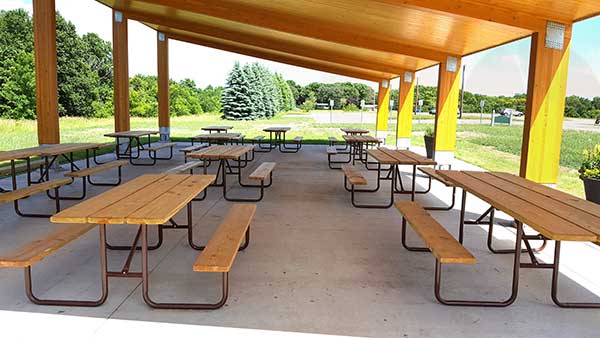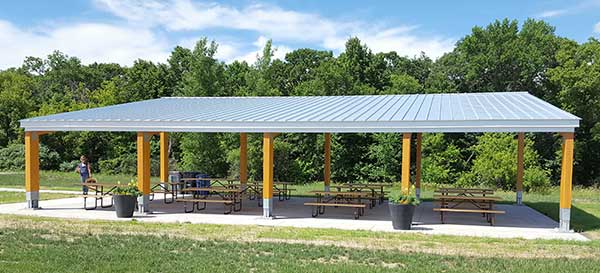 Picnic tables in the education area at the Tashjian Bee and Pollinator Discovery Center at the popular Minnesota Landscape Arboretum
Picnic tables in the education area at the Tashjian Bee and Pollinator Discovery Center at the popular Minnesota Landscape Arboretum
Visitors to the Tashjian Bee and Pollinator Discovery Center will now be able to sit on new wooden picnic tables to learn about the vital role these little flying workers play in the world's ecology.
The world-renowned research center is part of Minnesota Landscape Arboretum at the University of Minnesota in Chaska, MN.
The arboretum covers 1,137 acres and offers an amazing display of gardens, trails and natural areas with 5,000 different species of plants. It is considered to be one of the premier horticultural field laboratories and public display areas in the world and was named Best Botanical Garden in the country by USA Today's Reader' Choice Awards.
The bee studies at the center are generating quite a bit of "buzz."
In case you didn't know, bees play an incredibly important role in creating our food supply. It is estimated that as pollinators, bees contribute in the growth of nearly three-quarters of the plant food that we eat.
Of the world's 115 most popular and vital crops, 87 require pollination to create seeds, nuts, and fruits.
The contribution of bees is valued at $20 billion in North America alone.
However, extensive research is needed more than ever today. The number of honey bees has reportedly declined by about 50% since the 1950s and the situation is now referred to as Colony Collapse Disorder. Scientists are working hard to find out how to increase the number of honey bees to keep the pollination cycle alive.
Other bees contribute as well. The blue orchard bee pollinates fruit trees like apple and cherry trees. The squash bee assists with pumpkins, squash, and related vegetables. Bumble bees are important for the growth of tomatoes and peppers.
That's just a few of the types of bees that exist on the planet. There are actually almost 20,000 species of bees in the world. Many of them, 3500 species, can be found in the United States. There are 400 different types of bees in Minnesota alone. Only about 2% of bees are honey and bumble bees.
 Included with the wooden picnic tables at the bee center are four ADA-compliant tables
Included with the wooden picnic tables at the bee center are four ADA-compliant tables
Picnic tables added to education area
According to the center's website, "A healthy beekeeping industry is critical to both agriculture and the environment. Without honey bees, our food supply would be significantly reduced."
Employee Ping Honzay said the picnic tables were added to the area for tours and to help teach people about the importance of bees and the research being conducted to keep them thriving.
"We take our research findings and use it to educate people here," Ping said.
The facility also counts on donations to help pay for the research.
"They're great (picnic tables)," Ping noted. "We wanted a wood top with a metal base. They are serving all of our needs so far."
The center ordered 23 wooden picnic tables that were six feet in length and four that were eight feet long. The eight-foot picnic tables were also ADA compliant. (Americans with Disabilities Act). All wood is treated Southern pine and the base is powder-coated metal.
The Park and Facilities Catalog is proud to be a part of this great endeavor.
"We're excited that our picnic tables are available at the bee center to help people learn about the importance of bees in the environment," said Michael Kilmartin, senior executive at The Park Catalog. "Raising awareness about these incredible creatures is certainly a fulfilling project."


